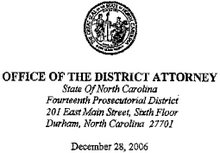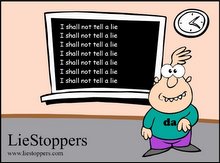On Friday, we addressed the benefits of filing additional 7A-66 affidavits. In response, some have asked for direction on how to create and file their own affidavits. With that in mind, we have prepared a step by step outline of the process.
.
Step 1 - Create the 7A-66 affidavit
Using this template (
7A-66 Affidavit ), follow the bracketed instructions located within the template for direction on where to enter your personal information. Enter your personal information by replacing the bracketed instructions with your legal name, county and state of residence as is applicable. Don't forget to remove the brackets. You will find bracketed instructions for entering your information in four places: the heading caption, the first line, paragraph 1 and the signature line of the notary page.
.
In addition to the four entries of your personal information, you will need to attend to paragraph 39 and the reference to it in the last sentence of paragraph 1. For paragraph 39, you will either remove the brackets and alternate instructions, delete the paragraph, or replace the text with your own. For the reference to paragraph 39 in paragraph 1, remove the brackets and amend according to how you addressed paragraph 39.
.
Feel free to add, delete, or change any paragraphs that you believe should be amended, removed, or included.
.
If adding additional citations as suggested in Friday’s article insert them in the appropriate paragraphs found near the end of the affidavit. Use paragraph 51 for noun and verb references and paragraph 53 for additional media cites of Nifong’s misconduct or disrepute. An additional paragraph, number 54 if no other changes are made to the affidavit, could be added for references to Nifong as the personification of misconduct outside the Hoax (see paragraph 52 and
Friday’s post).
.
Step 2 - Print 3 originals
.
You will need three originals - one for the clerk’s file, one for the judge, and one for yourself.
.
Step 3 - Print 3 copies of each of the attachments
Include one copy of each attachment with each of the three originals of your affidavit.
.
Step 4 - Number the pages of the attachments
.
In the top right corner, starting with attachment 1, number the pages of your attachments from 1 thru 74.
.
Step 5 - Have all 3 originals notarized
.
Step 6 - Mail or deliver all 3 originals to:
.
The Hon. Archie L. Smith, III
Clerk of Superior Court, Durham County
Durham County Judicial Building
201 E. Main Street
Durham, North Carolina 27701
.
If filing in person, you will find the Clerk of the Court offices on the third floor of the Durham County Judicial Building.
.
If sending by mail, include a self addressed stamped envelope and a cover letter asking Mr. Smith to file the affidavit and deliver it to the Senior Resident Superior Court Judge and return a file-stamped copy to you in the envelope you provided. Include your phone number, in case additional information is required.
.
There is no fee for filing the affidavit whether done by mail or in person.
.
You do not need to be a resident of Durham County to file an affidavit.































6 comments:
Must you be a resident of North Carolina or can anyone send this in?
Almost the same question - must you be a US citizen? I'm actually Canadian, and living in California.
Beth pointed out to me that the problem with living out of the area is you must attend the hearing.
Don't know if you could pay to have a local attorney represent you then without getting prior approval.
Can you provide a Word compatible version (ie. rtf).
12:22
Try this one:
http://hometown.aol.com/VIP%20PASSES/7A_66_Affidavit_MOD_1_.doc
It doesn't have the bracketed instructions but if you'll just replace the personal info with your own and attend to par. 39, it should work just the same.
9:27 and 10:59:
The statute does not define who may or may not file the affidavit. In re Hudson, the North Carolina Court of Appeals states, "In proceedings under N.C. Gen. Stat. § 7A-66, the affiant is not a party, but rather is merely a citizen presenting possible grounds for removal to the court." Other than "citizen" there is no guide.
kbp:
Not to disagree with Beth and if you look at the Spivey inquiry alone you might agree with the expectation that affiants would need to appear, but, the appeals in Hudson and Spivey seem to indicate otherwise.
"Further, Spivey asserted before the Supreme Court that the trial court erred by designating the affiants as petitioners and allowing them to participate as parties in the proceeding."
Post a Comment